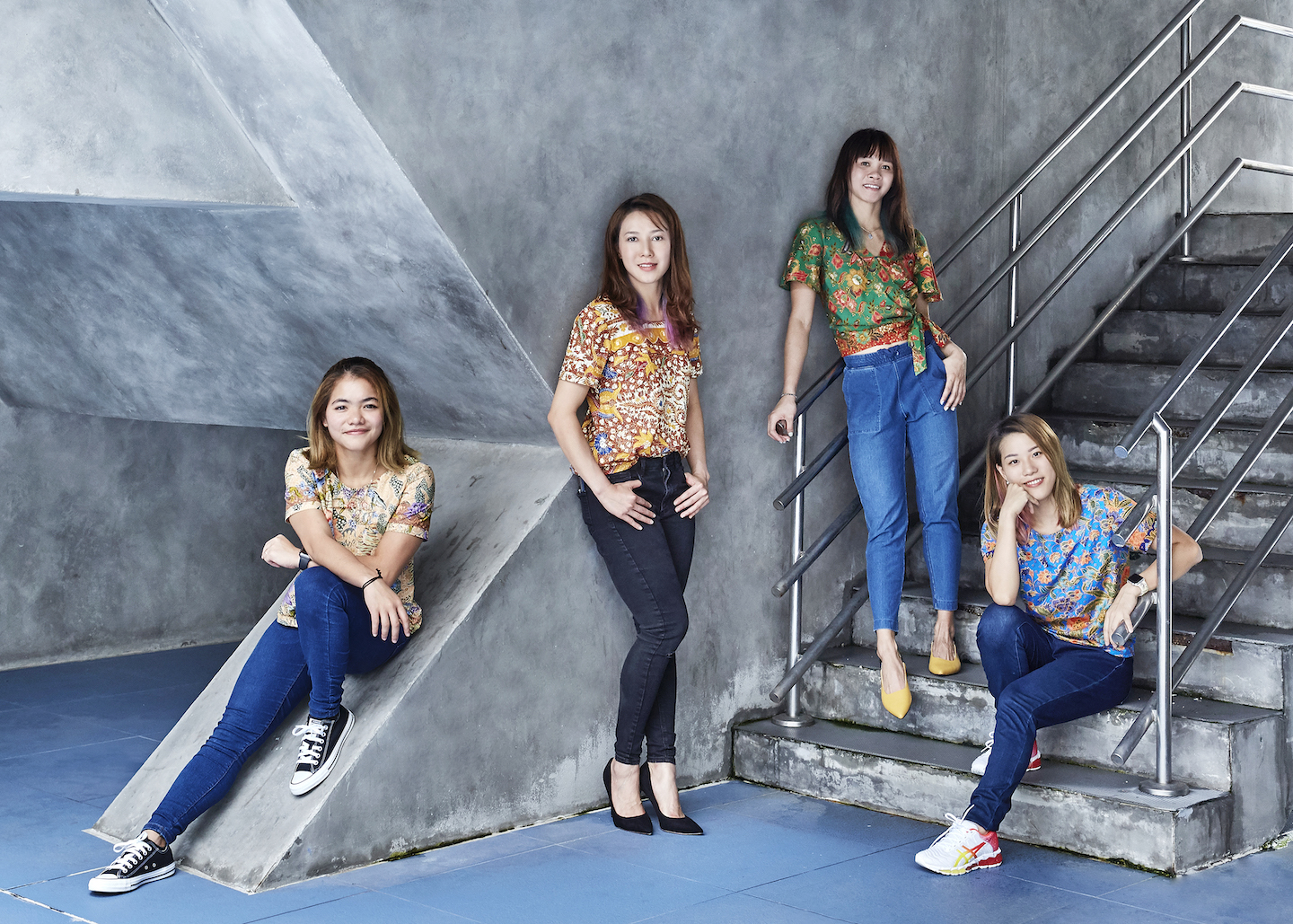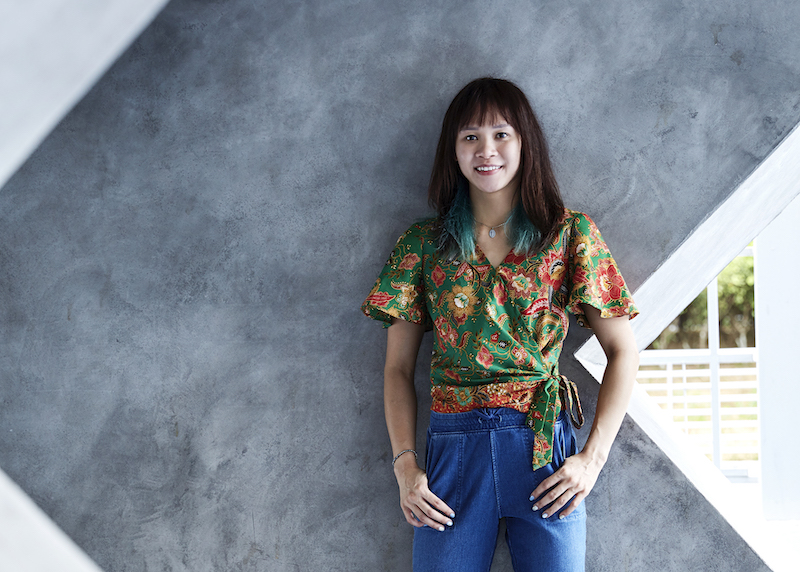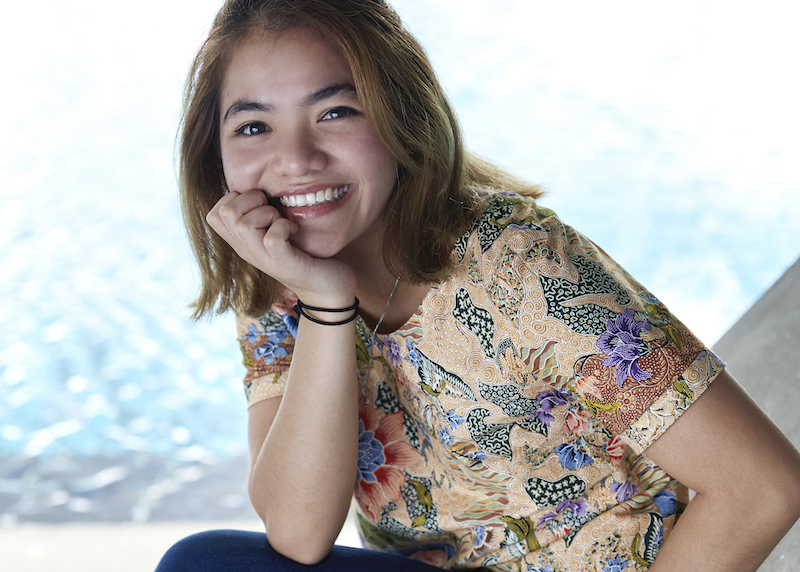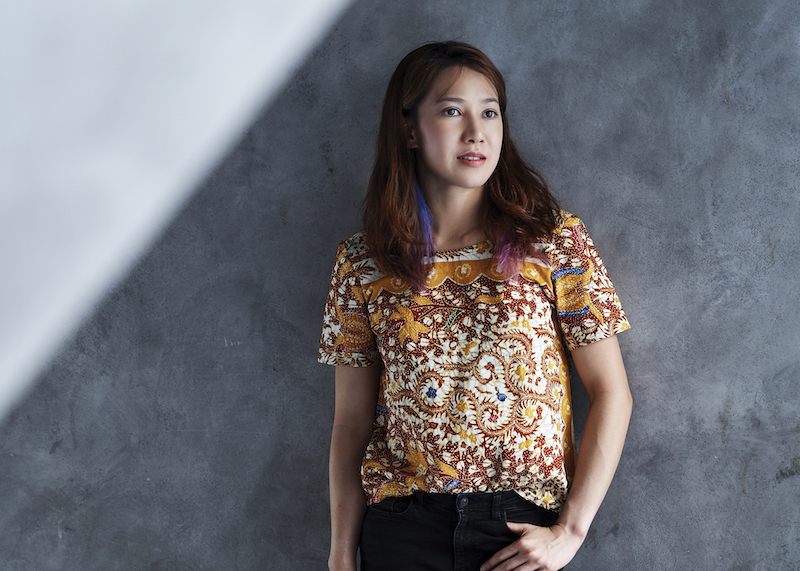
From left: Nur Dhabitah Sabri, Leong Mun Yee, Pandelela Rinong and Ng Yan Yee (All photos: SooPhye)
Diving is the only sport that has bagged Malaysia medals at the Summer Games, besides badminton and cycling. Options sat down with four Malaysian divers Pandelela Rinong, Nur Dhabitah Sabri, Leong Mun Yee and Wendy Ng Yan Yee who are gearing up for their upcoming mission, the Tokyo Olympics in July.
Pandelela Rinong
Going into her fourth Olympics in Tokyo, Pandelela Rinong, who has qualified for the 10m platform individual and synchronised events, is confident yet realistic. “The medal chances for both are there but it will not be easy to achieve [wins]. It will all come down to that particular day where whoever is able to give their best performance will grab the medal.
“Therefore, instead of feeling pressure to deliver, I’d rather be in the present, focus on my training and work hard to improve myself so I will not have any regrets.
“As long as the training can still go on normally and smoothly, and I’m able to get the right support like the sport treatment and recovery I really need, there’s no reason not to be ready for July.”
It is inevitable that the country’s medal hopes rest on her sturdy shoulders: Pandelela became the country’s first female athlete to win an Olympic medal when she came out third in the women’s 10m platform at London 2012. Her achievement was momentous because until then, badminton was the only sport that had delivered medals at the Summer Games. Four years later in Rio, she and Cheong Jun Hoong took the silver for the 10m synchronised platform.
But Covid-19 derailed Tokyo 2020 and the event has since been postponed to this year. As the organisers continue to iron out constraints and conditions to ensure safety for all competitors from July 23 to Aug 8, the athletes face a unique challenge: how to keep their mind on their goal, or gold, and stay motivated as the pandemic wreaks havoc around the world.
“To be frank, it has affected me mentally,” Pandelela says of the turn of events. Four years of preparation have exhausted her body and mind; the added year of waiting compounds the stress and has disrupted her plans for 2021.
With qualifying competitions such as the Fina Diving World Series either delayed or cancelled because of the coronavirus, and training camps a no go because of the Movement Control Order (MCO), training programmes for the divers shifted gear from going for peak performance to just fitness maintenance in the last year.
Pandelela, who took part in only one overseas competition in 2020, says she empathises with fellow athletes who, like her, are concerned about their preparations and well-being. But instead of worrying about things beyond her control, she has used the extra months to work on what is lacking in her dives.
Covid-19 has also given her time to beef up her strength and recover from injury. “I do sports recovery massage after my training every alternate day. For injuries that take longer to heal, I manage the pain with physiotherapy and rehabilitation at Institut Sukan Negara on weekdays, and go for extra treatment outside on weekends.”
The various iterations of the MCO have kept the Tokyo-bound divers within the Bukit Jalil National Sports Complex, where SOPs are strict and they follow daily training schedules. It is a far cry from previous pre-Games preparations, when they attended camps abroad or took part in various events as a sort of warm-up.
But just as she took to diving like a duck to water, adapting to change is second nature for Pandelela, from the time she caught the eye of a coach visiting her school to pick out students for aquatic sports training under her home state’s sports council programme.
She was born in a Bidayuh village called Kupuo Jugan in Bau, Sarawak, in 1993, the second of four children. The family then moved to Kuching, where the coach, impressed by her jump from a 5m platform — she could not even swim then! — suggested that she take up diving. That was in 2001.
She remembers those early days: “When I first took up diving, I wanted to look cool and brave in front of my peers because most of them dared not jump from the platform.”
Three years later, she won her first medal at a national schools meet. More followed and in 2007, she was recruited into the national team. In 2008, the 15-year-old took part at the Beijing Olympics, where she finished 27th among 29 divers.
London was her springboard to fame and glory. No one expected her to win a medal, not even herself, but she did the country proud by pushing herself to go for it after her first two mediocre jumps.
All eyes will be on her in Tokyo, where Pandelela sees strong contenders from China, North Korea and Canada in both her events, as well as Japan, which has good divers who may spring a surprise at the pool.
“Diving requires not just talent but also hard work, and high discipline — most of the coaches are very strict. It is easy to win but not easy to be consistent,” she says.
Almost two decades on, the adrenaline rush of leaping head first into the water has not waned. “The thrill of jumping from the high platform makes me excited, especially after a good dive,” Pandelela says when asked what attracts her most about the sport.
Retirement is a reality every athlete, however dedicated or passionate, faces. Could this be her last Olympics?
“Maybe a few more years. I hope I’ll still able to deliver as expected. I have my own plans and I will be ready [for retirement]. But I’d rather not talk about it as I am still living my passion.”
No pressure. When not training, Pandelela hits the sack to let her body rest and heal, meditates or watches Korean dramas and anime. Like many who have turned to e-learning during isolation, she takes online classes for personal development.
Nur Dhabitah Sabri
Athletes often talk about the joy they get from their chosen sport. National diver Nur Dhabitah Sabri shows it with her smiles — wide and spontaneous, in and out of the water, whether she wins or not.
She took up the sport after her teacher father approached the diving coach at the Cheras pool in Kuala Lumpur, where he had taken her for swimming lessons.
“The next day, I started my training. I was seven years old and didn’t even know that I had to do somersaults in diving,” says Dhabitah, who will be 22 in July.
That early start worked to her advantage: She began to impress at major tournaments in the region. At the 2013 SEA Games, she and Leong Mun Yee bagged gold in the 10m synchronised platform event.
Dhabitah created a splash in Rio de Janeiro with her megawatt smiles — smiling soothes her nerves, she says in interviews — and ninth placing among 12 finalists in the individual 10m platform. In the 3m springboard synchro, she partnered Jun Hoong to finish fifth among the eight teams.
In 2017, the dive darling was the final torchbearer at the opening ceremony of the SEA Games in KL and became the first female athlete to light the cauldron in Malaysia, host for the sixth time since 1965.
Dhabitah is up for the 3m individual in Tokyo and feels the heat to return with something in hand from her second Olympic outing.
“I do see my medal chances, but I need to be positive and try to control the pressure during the competition.” She reckons that the Chinese, Canadian, Australian and British divers will pose the biggest challenge to the Malaysian team.
The lockdown during the MCO was especially tough for her because it meant staying out of the pool for months. The postponement of the Games was worse news. But these hitches pushed her to amp up her training and make up for lost time.
Dhabitah remapped her daily sessions, intent on taking good care of her body with physio and massage sessions. Injuries sustained during training and competitions are nightmares, this petite diver says on the Olympic Council of Malaysia website.
Last December, the Olympics-bound women divers were able to take part in the 1st Malaysia Invitational Online event. It plunged them into competitive mode — timely, because most of them were not involved in any tournament for the better part of 2020.
The maiden event hosted by Malaysia Swimming also had participants from Australia, New Zealand, Japan and Singapore. It caused ripples as Malaysia became the first country to host a virtual competition for diving. Dhabitah paired with Wendy Ng Yan Yee to win gold in the 3m synchronised springboard. She had shone in the individual 3m springboard at the Asian Diving Cup in 2019.
Away from the aquatic centre, Dhabitah likes to spend time in bed watching movies and playing games, after the chores of washing and cleaning are done.
She hopes to dive for another six years, or even 10, god willing. After that? “Do other things that I have not experienced in life.”
As for what she has gained most from the sport, she says “experience, and love and support from my teammates”.
It is not difficult to picture Dhabitah adding her signature smile to those words.
Leong Mun Yee
Tokyo 2020 would have been Leong Mun Yee’s swansong and its postponement was like a wave that crashed her plans for the Olympics and after it.
“I was a little bummed at first because I had prepared very long for my fifth outing,” says the Ipoh-born diver who turned 36 last December.
Things took a positive turn when, like athletes worldwide forced to adapt by the coronavirus, Mun Yee found her feet. The first lockdown last year had kept her at home, where she did workouts for three months.
When pool training resumed in June, she appreciated that the Games delay meant more time to prepare as several tournaments leading up to it had been affected by the pandemic.
In 2012, Mun Yee made it into the Malaysian Book of Records for being the first female athlete to compete at four Olympics, consecutively from Sydney 2000. Come July, she will cement her place in diving history by representing the country a fifth time.
She had qualified for the synchronised 10m platform event with Pandelela at the 2019 World Aquatics Championships in Gwangju, South Korea.
“We are aiming for a medal in Tokyo and working hard towards it. This will be my last Olympics. Yes, of course there will be pressure.” Understandably so, with the pair going in as silver medallists from Gwangju as well as the 2020 Montreal World Diving Series.
Mun Yee anticipates competition from China, Canada and North Korea. The Korean pair of Kim Mi Rae and Jo Jin Mi won gold at the 2019 Fina Diving World Series in Montreal in the women’s synchronised 10m platform and may be strong rivals if they participate in Tokyo.
Experience, passion and dedication anchor Mun Yee’s hopes for an Olympic podium finish, a fitting finale for an athlete who has donned national colours for more than two decades.
She had taken up swimming initially but switched to diving at the age of 10 after a Chinese coach showed up at the pool to conduct tryouts. At 13, she was among the pioneer batch of divers who represented the country at the 1998 Commonwealth Games.
Diving has taught Mun Yee to be independent from young, she shares. It also makes her mentally stronger when confronted with life’s challenges. With this in mind, she plans to start an academy after retiring from the sport “so more kids will be able to try out diving, and to share my knowledge with others”.
Mun Yee is pursuing her master’s degree in corporate communication at Universiti Putra Malaysia. “Education is a lifelong journey that enhances my skills and knowledge personally and professionally,” she says on her web page.
As she plunges into the last laps of training before Tokyo lights the Olympic cauldron, Mun Yee’s routine centres on sleep, train, rest. “I make sure I have enough rest and proper recovery after each session.”
Away from the aquatic centre, the SEA Games and Fina Diving Grand Prix gold medallist, both in 2017, chills out by watching movies or learning to dance.
Wendy Ng Yan Yee
The experience of being able to compete in different venues around the world is something money cannot buy, says Wendy Ng Yan Yee. “It is something I will treasure.”
Up for the individual 3m springboard event in Tokyo, Wendy knows competition motivates athletes to go faster, higher and stronger, and raise their sports’ standards . Covid-19 put paid to major diving events in the last year and has impacted her performance. The fact that fellow divers worldwide are in the same boat galvanises her to resolve to step up her Games preparations and stay consistent.
“To be able to say I am ready, I train 110% every single day to maintain or improve myself during these hard times.”
Disrupted training schedules aside, the pandemic proved to be a blessing because it freed up time for Wendy to complete her sports science course in December. She had been pursuing it at Universiti Malaya since 2012. With degree in hand, she can fully focus on her next endeavour — making a splash at her third Olympics.
But before that, she is gearing to earn an additional slot in the 3m springboard synchro with Nur Dhabitah Sabri. The pair will get their chance to do that at the Fina Diving World Cup 2021 in Tokyo (April 21 to 26), which serves as a qualifying competition for the Summer Games.
Pandelela and Mun Yee are also headed for the World Cup, which will double as an opportunity to size up the competition.
China, whose divers have clinched top positions for years, may stand in the way of Malaysia’s medal dreams, Wendy thinks. Many other countries can block our way to the podium too. But no matter who the rivals are, her goal is clear: “Do my very best.”
Kuala Lumpur-born Wendy, 28 in July, has come a long way from her chance introduction to diving in 2004. “One day, my parents brought me to the pool to sign up for swimming classes. All of a sudden, a national diving coach asked if they would be interested to let me learn diving. That was how I started.”
Knowing nothing about the sport, the pressure of the water upon impact caught her by surprise. But every time she leaps off the platform, she is taken by the beauty of the dive — a feeling that continues to this day.
Wendy is mindful of pushing her body to execute difficult dives. Post-training therapy can help prevent injuries, she says.
In the months when Covid-19 infections were spiking, Wendy chose to stay home with her family, enjoying good food and engaging in activities to work off stress. “Having quality time with my family is the best cure for my stress.”
Now that training has resumed, it is back to the National Sports Complex hostel for her, but she makes it a point to find some “me” time to unwind.
Athletes get a high working their hearts out, but there are inevitable low points along the way. Wendy went through a rough patch in 2017 but it taught her to “never give up and believe that one day, I will bounce back. And to keep smiling”.
There is no saying how long she can stay in the game. “It depends solely on my body, how long more I can perform at my very best.”
But diving will remain a part of her life even after she retires. “I would really love to coach, to bring up the next generation of divers,” says Wendy, who adds that besides experience, what she has gained most from the sport are courage, self-integrity and consistency.
Watch the behind-the-scenes of their rigorous training below:
Credits:
Direction: Kong Wai Yeng
Videography: B&T Productions
This article first appeared on Mar 29, 2021 in The Edge Malaysia.






